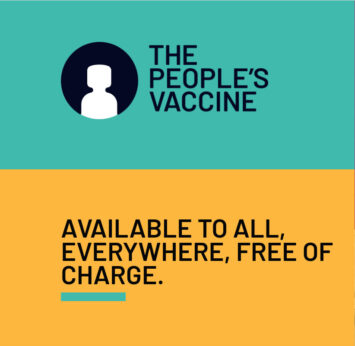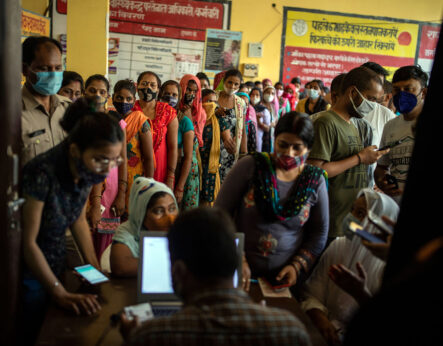
As the COVID-19 pandemic rages and new, more dangerous variants emerge, demands are growing for a “people’s vaccine” to counter the chief obstacle to global vaccination—Big Pharma profiteering.
Public health officials and infectious disease specialists all agree: The pandemic will not end until most of the world is vaccinated. Poor and medium-income countries face a public health catastrophe, but even people living in wealthier countries are not safe. The Delta variant has already led to a “pandemic among the unvaccinated.”
Vaccinating most of the world’s population faces two primary obstacles: right-wing and neo-fascist sabotage and extreme profiteering by a handful of global pharmaceutical companies resulting from their monopolization and privatization of the vaccines.
According to the Great Vaccine Robbery report by the People’s Vaccine Alliance, Big Pharma is deliberately blocking increased production while inflating vaccine prices. The result is vaccine scarcity and “scandalous inequity.” This “vaccine apartheid” is now unfolding as an immense tragedy across developing countries and entire continents.
Corporate profiteering, along with vaccine hoarding by wealthier capitalist countries, threatens to possibly extend the pandemic for years. Until the vaccines become a “global public good” and Big Pharma shares vaccine technology freely, the world’s population is in danger.
To date, COVID-19 has officially infected over 200 million people and killed over 4 million worldwide. New studies indicate, however, that the death toll could easily be double that figure. By recent estimates, the coronavirus has taken the lives of over 700,000 in the U.S. and four million in India alone, ten times higher than the official figures for that country.
 On August 8, the Biden administration’s chief medical advisor, Dr. Anthony Fauci, warned, “If you allow the virus to freely circulate and not try and stop it, sooner or later, there is a likelihood that you’ll get another (worse) variant that could…be more problematic than the Delta,” capable of evading the protections of current vaccines.
On August 8, the Biden administration’s chief medical advisor, Dr. Anthony Fauci, warned, “If you allow the virus to freely circulate and not try and stop it, sooner or later, there is a likelihood that you’ll get another (worse) variant that could…be more problematic than the Delta,” capable of evading the protections of current vaccines.
Of the four billion COVID-19 vaccine doses administered so far, over 90% have gone to people living in wealthier capitalist countries. Meanwhile, less than 1% of people living in the Global South are vaccinated, and billions await their first shot. Vaccination of a majority will likely not occur before the end of 2022.
In fact, according to the report, while most living in the rich G7 countries will be fully vaccinated by January 2022, based on current rates, the same coverage in low-income countries will take 57 years to achieve.
The emergence of a more contagious Delta variant prompted Pfizer and some public health officials to call for a booster shot for those already vaccinated. Public health officials so far strongly oppose this, fearing a deepening of the “vaccine apartheid.”
“WHO is calling for a moratorium on boosters until at least the end of September to enable at least 10% of the population of every country to be vaccinated. To make that happen, we need everyone’s cooperation, especially the handful of countries and companies that control the global supply of vaccines,” said WHO director-general Tedros Adhanom Ghebreyesus.
Pharmaceutical corporations are raking in super profits by using their power to restrict and monopolize production to inflate vaccine prices per dose. Pfizer-BioNTech and Moderna charged governments between six and 24 times the cost of production, totaling $41 billion. For example, Columbia alone overpaid by $375 million.
Meanwhile, Johnson & Johnson, Pfizer, and AstraZeneca reported $26 billion in profits over the past 12 months. And if that weren’t bad enough, Pfizer and Moderna hiked vaccine prices by 25% and 10%.
The cost to produce one dose of vaccine is about $1.20. If vaccines were administered as a “global public good” in response to a health emergency without profiteering, facilities could produce eight billion doses for approximately $31 billion. The cost is a pittance compared to the budgets of wealthier capitalist countries.
Not only have wealthier countries hoarded vaccines, but they collectively only contributed $10 billion to fund the cost of vaccine production and distribution to poorer countries. Meanwhile, these same governments spent $100 billion for research leading to the vaccine and early procurement. The U.S. government, for instance, shares patent rights for the molecular engineering that led to the Moderna vaccine.
The global shortage of vaccines was avoidable had these governments written demands to share technology into their contracts with Big Pharma, something the WHO has insisted on for years. WHO established a Technology Access Pool, hoping companies would voluntarily share know-how and intellectual property. So far, none have responded, and there is little reason to expect they will unless forced.
COVAX (Covid-19 Vaccines Global Access Facility) is a joint project of the WHO, GAVI (Vaccine Alliance), and CEPI (Epidemic Preparedness Innovations). The U.N. established it to ensure wealthier countries share vaccines with low and medium-income countries. The People’s Vaccine Alliance report sharply criticized COVAX for its cozy relationship with Big Pharma, lack of transparency, and refusal to demand vaccines be treated as a public good. COVAX doesn’t support the WHO Technology Access Pool.
COVAX’s goal was to provide enough vaccines for 20% of the populations of the 92 poorest countries; so far, it is paying 500% more than the cost to produce the vaccines.
Meanwhile, the governments of the wealthier capitalist countries are protecting the pharmaceutical companies (in part through COVAX). The governments refuse to demand that Big Pharma waive intellectual property rights and transfer its technology to production facilities worldwide, including developing countries, which would result in ramping up production.
COVAX depended on production from India, considered the pharmaceutical factory of the world, for distribution to developing countries. But skyrocketing COVID-19 cases at home forced India to halt vaccine exports.

The Biden administration backed a call by India and South Africa to lift Big Pharma’s intellectual property rights in the World Trade Organization in May, but the administration has been silent ever since. Meanwhile, Germany, the European Union, the U.K., and Canada are openly blocking any action in the WTO.
The Biden administration has carried out a very effective domestic vaccination program despite GOP and right-wing sabotage, resulting in 71% of U.S. adults getting at least the first vaccine dose. The administration could use powers under the Defense Production Act to mandate technology transfers and expand emergency production but so far has taken only minor steps. Biden could easily justify lifting patent rights since U.S. government funding helped develop and procure the vaccines.
Even with more production, many developing countries are unable to afford vaccines even at cost. For example, Uganda allocates $6.83 per person per year in its health budget. That’s already eight cents more than the African Union paid for each vaccine dose. So even if Uganda shut down the rest of its health care system and spent every penny of its health budget on vaccines, it still wouldn’t be able to afford enough doses for its people.
Breaking the Big Pharma monopoly is critical, and there are precedents, including during the HIV-AIDS crisis. Generic alternatives radically reduced HIV drug prices. Challenges to Big Pharma monopoly also come from China and Russia, which expect to produce four billion doses of vaccines developed in those countries. Cuba also has five vaccine candidates for distribution. Cuba and China consider vaccines a “global good” and intend to distribute them without profiteering.
Without a high level of global vaccination, the pandemic threatens to continue to ravage the world for years to come. The time for a “people’s vaccine” is now.










